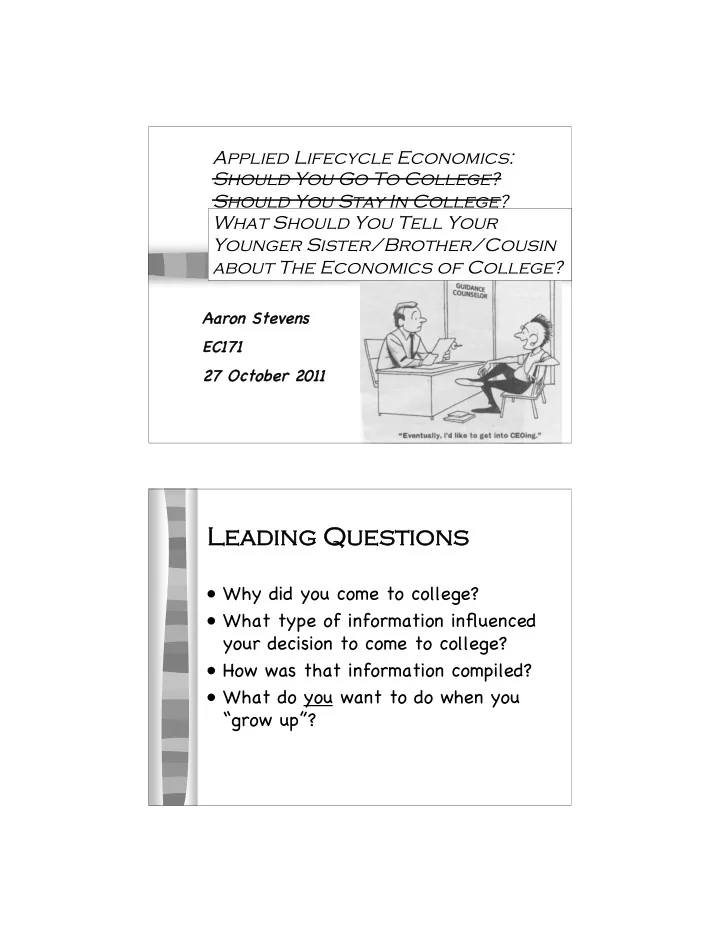

Applied Lifecycle Economics: Should You Go To College? Should You Stay In College? What Should You Tell Your Younger Sister/Brother/Cousin about The Economics of College? Aaron Stevens Aa EC1 EC171 71 27 27 October tober 201 2011 1 Leadi Leading ng Questi uestions ns • Why did you come to college? • What type of information influenced your decision to come to college? • How was that information compiled? • What do you want to do when you “grow up”?
Wh What They Said About Go Going to Co College Lifetime Earnings Soar with Education . http://usgovinfo.about.com/library/weekly/aa072602a.htm Wh What Are The Costs of a Col College De Degre ree? • Direct costs: tuition, room and board, books and materials, entertainment • Financing costs: loan payments or forgone use of capital • Opportunity cost? Add it up: how much does this cost?
Fai Failu lure re to to Get t a a De Degre gree 6-year graduation rates, 2008 data: Source: http://www.higheredinfo.org/dbrowser/index.php
Col College Grad Grads Hol Holding No Non-Co College Jobs Source: “Outcomes for College Graduates” http://www2.ed.gov/pubs/CollegeForAll/graduates.html Col College Grad Grads Hol Holding No Non-Co College Jobs According to BLS 17,000,000 Americans with college degrees are doing jobs that don’t require a degree.
Stu Stude dent nt Loan Loan Hell ll • Average student loan debt among graduates of private non-profit institutions: $34,212 See: ee: http://www.fi .finaid.o .org/loans/ • 71% of students borrowed • Many borrowers pay more in loan payments than rent! • Student loan debt now exceeds credit card debt http://www.federalreserve.gov/RELEASES/g19/Current/ • Up to 25% of borrowers default on student loans • “Government Vastly Undercounts Defaults” http://chronicle.com/article/Many-More-Students-Are/66223/ Apples Apples to to Apples Apples How can we do an apples-to-apples analysis? • What is the total cost of a BU degree? • What if Mom and Dad are paying? • What is your next best alternative? • What about taxes and benefits? • Back to the future analysis using ESPlanner.
Non-College Jobs "there are something like 50 million jobs out there that don't require a bachelor's degree and pay upwards of $40,000 a year." -- Harlow Unger, author of "But What If I Don't Want to Go to College? A Guide to Success Through Alternative Education.” Top 25 highest paying jobs that don’t require a college degree: http://jobs.aol.com/articles/2009/06/26/25-highest-paying-jobs-no-bachelors-degree-required/ Cal Calcu culat ating Cos Costs TOTAL: $59,714
Thi This s is s Your Your Li Life fe What will you be when you grow up? • You the electrician • You the engineer (and who would you want to marry?) Thi This s is s Your Your Li Life fe Electrical you: • Begin work after high school, starting salary of $43,178. • After 5 years, you earn the mean salary of $48,100. Software Engineering you: • Graduate from BU, starting salary is $49,928. • After 10 years, you earn the mean salary of $72,010. US Department of Labor, “May 2007 Occupational Employment and Wage Estimates -- National Cross-Industry Estimates”. http://www.bls.gov/oes/2007/may/oes_nat.htm
Con Consump mption on Smoot Smoothing What will you be when you grow up? Common Common Assump mption ons • Everyone retires at age 65 • College is paid for by borrowing • student loans paid back over 30 years • interest rate of 7.65% (average of Stafford Loans and Federal PLUS loans) • Ceteris Paribus: • No spouses, children, houses, etc. • “Living standard” is consumption-smoothed after-tax income less savings.
You You the the Methodology note: account for opportunity cost (time) by adjusting the age when subject enters workforce. You You the the
An An Elec lectri trician? an? Phrases heard at the dinner table: • “What kind of job is that for a ….. ?” • “We didn’t work this hard for you to become a … ! Di Dire rect ct Cos Cost t Colle College ge: Use student loan to account for direct cost and finance cost of college:
You You the the Assume: working retail for $9/hour = $18,000/year. Methodology note: account for opportunity cost (time) by adjusting the age when subject enters workforce. You You the the I’m not dead yet! How am I going to eat?
You You the the @ Notice: the costs of a college education are the same irrespective of course of study. You You the the @
You You the the You You the the
You You the the St Standa ndard d of of Li Living ng
Wh What You Learned Today Just Just “go going to college” d doesn’t ne necessa ssari rily ly bui uild ld Hum uman n Capi pita tal! l! Inc Inclu lude actu tual co costs and opportunity co cost, years years of lost wages ages, bo borro rrowing Ma Make an apples-to-apples comparison an and d ev eval aluat uate e stan andard dard of living! g! Announc Announceme ment nts and nd To o Do Do Readings for Today and Thursday: • Deb ebt-Free ee U • STTE: ch 9, 10 • Government Vastly Undercounts Defaults http://chronicle.com/article/Many-More-Students-Are/66223/ • http://www.studentloanjustice.org/ Ho Homework 6: 6: do on n your own n to see what you you lear earn Ho Homework 7: 7: assigne ned TUE TUE 11/1, due 11/3
Follow Follow up Readi ading ng • Freeman, Richard B. "The Facts about the Declining Economic Value of College." Journal of Human Resources 15.1 (1980): 124-42. EconLit. ESBSOhost. Boston University Library. 25 Sep. 2008.
Recommend
More recommend